Moss Adams Voices
Makaiya Simmons: Finding Ourselves in Art
Makaiya Simmons helps us celebrate Black History Month with a reflection on this year’s theme: African Americans and the Arts.

Makaiya Simmons (she/her), a resource management specialist in Everett, has often struggled to feel authentically connected with the Black community. Growing up as a mixed-race woman in suburbia, Makaiya was regularly the only woman of color in any given area—but exposure to rich international culture inspired her to make more meaningful connections with Black culture at home. It wasn’t long until Makaiya realized that playing the clarinet, which she began in third grade, was connected to one of the cornerstones of Black culture—music. In this year’s Black History Month celebration, Makaiya speaks about her experiences with identity, community, and the arts.
What comes to your mind about this year’s Black History Month theme, African Americans and the Arts?
Music. I’ve had the privilege of meeting people from Cameroon, Nigeria, Ghana, and Kenya, and they shared with me how important music has been in their traditions—music and dancing keep their culture alive so far from home. That’s when I realized how important music is for us. Even if we don’t know how to trace our ancestry back to Africa, I think music helps us find ourselves. When my family gets together, we listen to jazz, Motown, and ‘90s hip-hop. It connects us.
I once visited the Motown Museum in Detroit and learned how hard the greats worked to make music, and their experiences weren’t the same as those of other artists of that time who weren’t Black. Once we know that history, we see why Black music has so much truth. I hear that story when I listen to music from Black artists, and I understand why music is so important to Black culture.

What personal experiences connect you to the relationship between Black culture and music?
I played the clarinet for 13 years until my sophomore year of college. I heard a story in the music our band made, too. I don’t play as often anymore, so these days, I get my creative fix while baking, collecting art with my partner for our home, or painting with our four-year-old son. When I declared a major in public relations, I couldn’t dedicate as much time to playing. It worked out because I experienced other things like the Black Student Union.
I’d never immersed myself in Black culture before, but I studied abroad for almost three months and enjoyed experiencing a new culture. Being around so many brown-skinned folks in Spain brought me to realize how little I had immersed myself in Black history, culture, and environments. I wanted to be engaged in culture at home, too.
What limited your experience with Black history and culture?
It was the environment where I was raised. One of my best friends, whom I met in college, is also mixed-race, and she’s had experiences opposite to mine—she was raised in a more diverse neighborhood, but I was raised in the suburbs. My interests, activities, and friendships often reflected that, and I had a mentality I wasn’t Black enough, which made it hard for me to put myself in more diverse communities. I even heard people say this in college sometimes, which made me uncomfortable reaching out.
For a long time, I only felt connected to my Black identity when visiting my mom’s family in Sacramento. Looking back, I wish I had done things differently. I don’t think I understood how othered I felt when I was younger. It’s something I can’t help but be conscious of nowadays, especially when I’ve been the only Black person in some of the departments where I’ve worked. I get really tired of being the spot of color in the team picture. I don’t want to feel like the token for the rest of my life. It’s not a great feeling.
That’s why I am actively trying to seek out diverse spaces now. When I joined the Black Student Union, I blended into the pictures instead of sticking out for being the tan one. The Black professors I knew in college were so supportive. They wanted us to feel accepted, earn our education, and experience community. The Black BRG has been similar for me because BRG leadership is determined to help us experience community at Moss Adams.

How has deepening your connection to the Black community made a difference for you?
I’ve been able to come into myself and validate who I am. I used to think someone had to show me they accepted me, but acceptance had to come from within. For example, I used to hate my hair. I always straightened it. I never wanted my son to feel that way, so I’m working hard to teach him how to love his hair. He’s told me he loves his hair, and it makes me happy when he says that. The book and animated short Hair Love has had such an impact on me—I tear up thinking about it because sometimes hair means more to us than we realize. I’m learning to love my hair, too.
My partner and I decided to move from our rural Washington town so our son would have a lifestyle that reflected his identity. I wanted him to see people like him growing up.
I used to think I had to be a certain way to be considered Black, but I had to grow and understand myself and the diversity of our people. Not every Black person listens to rap, and I’m not any less Black if I like pop-punk or hanging out with skaters. It’s helped me get closer to my best friend. We’re Black women who love Bleachers, acoustic guitar, and brew fests. People may not think Black people enjoy those things, but we both love them—and if we’re there, it means some Black people do those things, even if you don’t expect us.
Go Beyond the Desk
At Moss Adams, we believe in the power of possible to empower our clients and people to pursue success however they define it. Explore stories about our professionals, including their personal achievements, at our Beyond the Desk page.